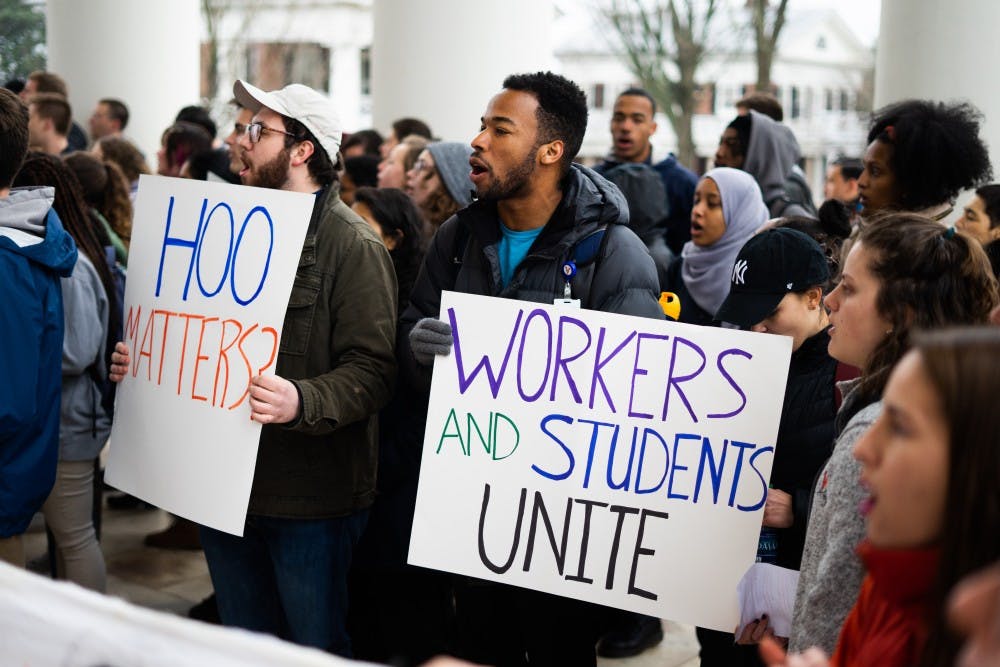Huge developments have occurred over the past few weeks for the University’s Living Wage Campaign. President Jim Ryan’s community working group released a bombshell report on the relationship between the University and Charlottesville residents. Within this report, the community working group cited staggering figures — almost 2,400 University employees report that they have to put at least half of their wages into paying rent alone for a two-bedroom apartment. Following this report, the long-acting Living Wage Campaign showed up at the Rotunda on March 4 to protest these inequities while the Board of Visitors sessions were ongoing. A window on the north side of the Rotunda broke during the demonstrations, but both the Living Wage Campaign and the University contend that their protesting was peaceful.
Fast forward to this past Thursday when Ryan released a statement to the entire University promising that “starting January 1, 2020, UVA will begin paying all full-time employees a living wage of at least $15 an hour.” This announcement is historic. The Living Wage Campaign at the University, has been active since 1998, and was previously the longest unsuccessful wage campaign at a collegiate university. With the fight for 15 achieved, both students and the University administration now need to consider what further steps should be taken in order for us to continue to progress toward a more equitable community.
To start, both the community working group and the Living Wage Campaign agree that wages often act as the lynchpin for living equality. However, the Living Wage Campaign has been advocating for a slightly higher hourly wage with the #FIGHTFORSIXTEENUVA. While the Ryan’s promised minimum hourly wage of $15 is certainly a welcome change from the current minimum wage level of $12.75, $15 still falls short of a real liveable wage. According to MIT’s Living Wage Calculator, for one adult to support both herself and her child, she needs to make at least $27.42 per hour.
The University’s action to up its wages to $15 reflects a common reaction to worker protests.
Similar to fast food industry’s Fight for Fifteen campaign started in 2012 within New York City, this group advocated for $15 minimum wage as well as the right to unionize. As politicians begin to warm to the idea of raising wages, their original goalpost figure of $15 now is far below what the common worker needs for a living wage in NYC. Essentially, by the time major employers in the area, like the University or major corporations, make concessions to workers, the target wages set by organizers in the years prior are outstripped by rising housing prices and inflation rates.
For naysayers worried that a spike in minimum wage would further drive up negative externalities, the United States actually has a relatively low minimum wage for its advanced economy. The American minimum wage is actually neck and neck with the Slovenian, Greek, and Spanish minimum wages, all countries with lower GDP and worker productivity.
These types of trends are particularly salient to Charlottesville. While the City can boast a low unemployment rate, housing insecurity and homelessness persist as major issues for Charlottesville. As an employee of The Haven, a nondiscriminatory homeless shelter in downtown Charlottesville, astutely notes that housing remains a perennial issue for residents, because “the cost of living is sky high, and low income housing’s very rare.” The severity of Charlottesville’s impossible working conditions — high cost of living and even higher rent costs — breeds an environment where upward mobility for residents becomes a pipe dream. A recent analysis by the New York Times found that Charlottesville ranks in the bottom third percentile of counties that enable upward mobility for its poorest families’ children. Hauntingly, analysts start their summary of Charlottesville with “Location matters — enormously” and the sooner a family moves to Madison County “the better you will do on average.”
Given how extreme circumstances have become in Charlottesville, change is still needed. Luckily, Ryan pledged that “nothing was off limits” for the community working groups’ initiatives. Additionally, he’s emphasized that he believes that institutional accountability is critical to finding lasting solutions to Charlottesville’s woes. Hardworking student activist groups such as Living Wage Campaign also will be critical in forcing the University to continue to work on the gaping inequities in our community. We won the fight for fifteen. But, in the march for true justice, the fight must go on much, much longer.
Katherine Smith is a Senior Opinion Columnist at The Cavalier Daily. She can be reached at k.smith@cavalierdaily.com.







